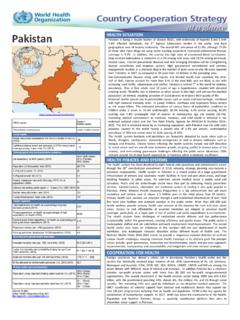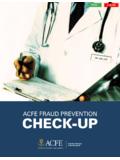Transcription of Poverty and Climate Change - OECD.org
1 Poverty and Climate ChangeReducing the Vulnerability of the Poor through Adaptationprepared by:African Development Bank Asian Development Bank Department for International Development, United Kingdom Directorate-General for Develop-ment, European Commission Federal Ministry for Economic Cooperation and Development, Germany Ministry of Foreign Affairs -Development Cooperation, The Netherlands Organization for Economic Cooperation and Development United Nations Development ProgrammeUnited Nations Environment ProgrammeThe World BankIIIIIC ontentsList of Boxes, Figures, Tables, Acronyms and AbbreviationsIVForewordVAcknowledgements VIExecutive SummaryIXPoverty Reduction the Challenge of the 21st CenturyIXClimate Change is Happening and Will Increasingly Affect the PoorIXAdaptation is NecessaryXStrengthening Adaptation EffortsXINext StepsXIIPart 1.
2 Climate Change and the Change is a Countries Will Be Particularly is a Vulnerability to Climate Stressed Coping Change Compounding Existing Risks and for Poverty Eradication11 Part 2: Adaptation Lessons from Past Vulnerability in the Context of Sustainable Growth and Adaptation to Climate Governance to Mainstream Climate Issues in Poverty Reduction24 Part 3: The Way Adaptation into Sustainable and Strengthen Assessment and Information with the UNFCCC Synergies with Other Multilateral Environmental Funding33 Notes35 Glossary37 References39 IVList of BoxesBox 1 Climate Change Impacts on Malaria 9 Box 2 Impacts of Climate Change on Small Island States: The Pacific 10 Box 3 Drought and Livelihoods in the Sahel 16 Box 4 Need for Social Capital Building to Cope with Climate Impacts 16 Box 5 Mangrove Planting in Vietnam 17 Box 6 Climate Information for Southern African Farmers 18 Box 7 Traditional Forecasting in the Andes 19 Box 8 Economic Planning for Disasters in Honduras 21 Box 9 Mexico s Experience in Funding Natural Disaster Relief 24 Box 10 Public Accountability for Flood Protection in Bangladesh 24 Box 11 Reducing the Vulnerability of Women to Cyclones in Bangladesh 25 Box 12 Kiribati s Mainstreaming in National Planning Processes 26 Box 13 Mozambique s Action Plan for Poverty Reduction 27 List of FiguresFigure 1 Variations in the Earth s Surface Temperature.
3 1000 2100 1 Figure 2 Maize Production in Selected South African Countries versus Ni o 3 Data 20 Figure 3 Potential Impacts of Temperature Increases on Tea Growing in Kenya 28 List of TablesTable 1 Impacts of Climate Change , Vulnerability, and Adaptive Capacity 3 Table 2 Potential Impacts of Climate Change on the Millennium Development Goals 12 Acronyms and AbbreviationsGDP Gross domestic product GEF Global Environment Facility GHG Greenhouse gas IPCC Intergovernmental Panel on Climate Change LDCs Least developed countries LEG Least Developed Countries Expert Group MDGs Millennium Development Goals NAPA National Adaptation Programme of Action PRS Poverty Reduction Strategies PRSP Poverty Reduction Strategy Paper RCOF Regional Climate Outlook Forum UNFCCC United Nations Framework Convention on Climate Change VARG Vulnerability and Adaptation Resource Group VForewordClimate Change is a serious risk to Poverty reduction and threatens to undo decades of devel-opment efforts.
4 As the Johannesburg Declaration on Sustainable Development states, theadverse effects of Climate Change are already evident, natural disasters are more frequent andmore devastating and developing countries more vulnerable. While Climate Change is aglobal phenomenon, its negative impacts are more severely felt by poor people and poorcountries. They are more vulnerable because of their high dependence on natural resources,and their limited capacity to cope with Climate variability and suggests that the best way to address Climate Change impacts on the poor is byintegrating adaptation responses into development planning. This is fundamental to achievethe Millennium Development Goals, including the over-arching goal of halving extremepoverty by 2015, and sustaining progress beyond objective of this document is to contribute to a global dialogue on how to mainstreamand integrate adaptation to Climate Change into Poverty reduction efforts.
5 We hope this willmove the discussion further towards this joint paper focuses on adaptation to Climate Change in relation to Poverty , weunderstand that adaptation has to go hand in hand with mitigation of Climate Change bylimiting greenhouse gases in the atmosphere. We also reaffirm that industrialized countriesshould take the lead in combating Climate Change and its adverse share a commitment to assisting and working with poor people, partner governments,civil societies, and the private sector in coping with the vulnerability of the poor to climatechange. We resolve to ensure that our own institutions support this NielsonCommissioner for Developmentand Humanitarian AidChief Executive Officer for EuropeAid Co-Operation OfficeEuropean CommissionTadao ChinoPresidentAsian Development BankMark Malloch BrownAdministratorUnited Nations Development ProgrammeHeidemarie Wieczorek-ZeulMinisterFederal Ministry for Economic Co-operation and Development, GermanyDonald J.
6 JohnstonSecretary-GeneralOrganisation for Economic Co-operation and DevelopmentKlaus T pferExecutive DirectorUnited Nations EnvironmentProgrammeHilary Benn DFID Minister of StateUnited KingdomShengman ZhangManaging DirectorThe World BankAgnes van Ardenne-van der HoevenMinister for Development CooperationThe NetherlandsOmar KabbajPresident,African Development Bank GroupVIAcknowledgementsThis document has been written by a team consisting of Piya Abeygunawardena (ADB);Yogesh Vyas (AfDB); Philipp Knill (BMZ); Tim Foy, Melissa Harrold, Paul Steele, and ThomasTanner (DFID); Danielle Hirsch, Maresa Oosterman, and Jaap Rooimans (DGIS); MarcDebois and Maria Lamin (EC); Holger Liptow, Elisabeth Mausolf, and Roda Verheyen (GTZon behalf of BMZ); Shardul Agrawala, Georg Caspary, and Remy Paris (OECD); ArunKashyap (UNDP); Ravi Sharma (UNEP); and Ajay Mathur, Mahesh Sharma, and Frank Sper-ling (World Bank).
7 Frank Sperling (World Bank), as Managing Editor, synthesized the content of the report,based on the contributions of the agencies. Heather Budge-Reid provided editorial writing team benefited greatly from comments by colleagues within our agencies pro-vided for the final document as well as the earlier consultation draft. These include SujataGupta, Pim Kieskamp, and Rolf Zelius (ADB); Fenella Frost, Alicia Herbert, Julian Lob-Levyt,Helen O Connor, and Julie Thomas (DFID); Diana Wilkens and Ken Wright (DEFRA); JohnBazill, Juan Garay Amores, Anver Ghazi, Joachim Kreysa, Simon Le Grand, Jean-Paul Malin-greau, and Emmanuel Mersch (EC); Tom Jones and Michael Roeskau (OECD); Rebecca Car-man, Pascal Girot, Richard Hosier, Khalid Husain, Selim Jehan, Bo Lim, Joseph Opio-Odon-go, Jyotsna Puri, Minoru Takada, and Alvaro Uma a (UNDP); Daya Bragante and KristenHalsnaes (UNEP); Anna Ballance (UNEP-GRID Arendal); Margaret Arnold, Jeni Klugman,Kseniya Lovovsky, Panayotis Varangis, and Bob Watson (World Bank).
8 In addition, the following organizations provided their time and input: Henk van Schaik(Dialogue on Water and Climate ); Eileen Shea (East-West Center, Climate Project Coordina-tor); Charlotte Howard and Anna McGillivray (ERM); Saleemul Huq (IIED); John Drexhage(IISD); Roberto Lenton, Maxx Dilley, and Shiv Someshwar (IRI); Balakrishna Pisupati andBrett Orlando (IUCN); Kees Dorland, Michiel van Drunen, Marcel Kok, and Peter van derWerff (IVM); Richard Klein (PIK); and Madeleen Helmer (Red Cross Climate Centre).The consultation draft was presented at the Eighth Conference of Parties to the UnitedNations Framework Convention on Climate Change in New Delhi, 2002. Subsequently, thepaper has been widely disseminated and an electronic consultation was held from Novem-ber 15, 2002 to February 28, 2003.
9 The authors are grateful for the large and constructivefeedback received from non-governmental organizations, the private and public sector, andinternational organizations. These comments provided valuable perspectives and views andchallenged us to revise the document in a manner that was both intellectually rigorous andsensitive to divergent opinions. We have attempted to accommodate the comments; how-ever, the responsibility for the document remains with the ten organizations involved in thewriting SummaryPoverty Reduction the Challenge of the 21st CenturyDespite international efforts, Poverty has become more widespread in many countries in thelast decade, making Poverty reduction the core challenge for development in the 21st centu-ry. In the Millennium Declaration, 189 nations have resolved to halve extreme Poverty by2015 and all agencies involved in this paper are committed to contribute to this aim.
10 How-ever, Climate Change is a serious risk to Poverty reduction and threatens to undo decades ofdevelopment paper focuses on the impacts of Climate Change on Poverty reduction efforts in the con-text of sustaining progress towards the Millennium Development Goals and beyond. It dis-cusses ways of mainstreaming and integrating adaptation to Climate Change into povertyreduction and sustainable development chief messages emerging from this paper are: Climate Change is happening and will increasingly affect the poor. Adaptation is necessary and there is a need to integrate responses to Climate Change andadaptation measures into strategies for Poverty reduction to ensure sustainable decision to focus on adaptation is deliberate and is taken with the understanding thatadaptation cannot replace mitigation efforts.
















